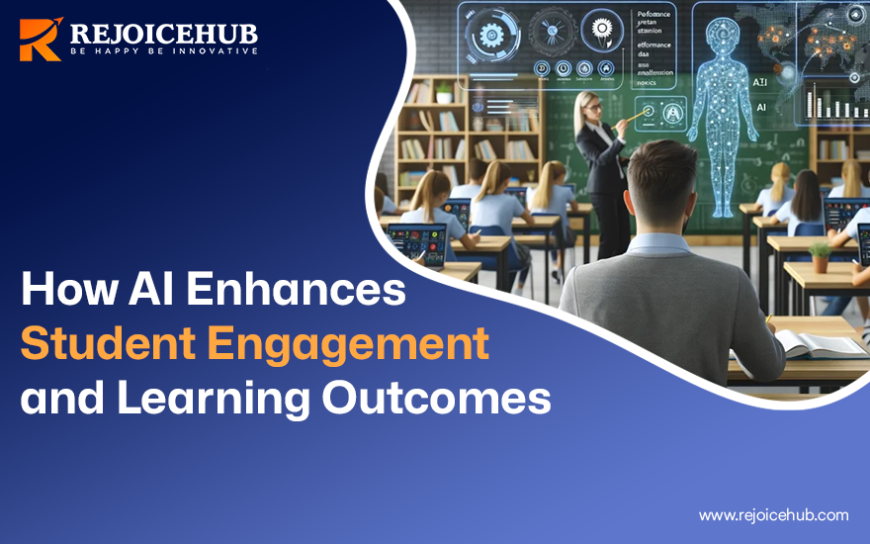How AI Enhances Student Engagement and Learning Outcomes
Discover how AI enhances student engagement and learning outcomes by providing personalized education, intelligent tutoring, automated grading, and data-driven insights for educators. Explore the key advantages of AI in education.

In today’s digital age, artificial intelligence (AI) is reshaping education by creating personalized learning experiences, improving engagement, and enhancing student outcomes. With AI-driven tools, educators can deliver customized instruction, assess student performance more effectively, and foster interactive learning environments. Let’s explore how AI is transforming education and benefiting students.
1. Personalized Learning Experiences
AI-powered platforms analyze student data, learning styles, and progress to tailor educational content accordingly. Adaptive learning systems adjust difficulty levels and recommend resources based on individual strengths and weaknesses. This ensures that students receive the right level of challenge and support, making learning more effective.
Example: Platforms like Khan Academy and Coursera use AI to provide customized lesson plans, helping students learn at their own pace.
2. Intelligent Tutoring Systems
AI-driven tutoring systems provide instant feedback and assistance, replicating one-on-one tutoring experiences. These systems identify knowledge gaps and offer explanations, quizzes, and exercises to reinforce concepts.
Example: Duolingo employs AI to adjust language learning exercises based on the learner’s proficiency and mistakes.
3. Automated Grading and Feedback
AI automates the grading process, reducing educators’ workload and providing students with instant feedback. AI can assess multiple-choice tests, written assignments, and even coding exercises with high accuracy.
Example: Platforms like Grammarly use AI to evaluate essays, providing detailed feedback on grammar, tone, and readability.
4. Enhanced Student Engagement
Interactive AI-powered tools, such as chatbots and virtual assistants, keep students engaged by answering their questions and providing real-time support. Gamification elements powered by AI also enhance motivation by incorporating rewards, challenges, and leaderboards.
Example: Google’s Socratic app uses AI to provide step-by-step explanations for student queries, making learning more interactive.
5. Data-Driven Insights for Educators
AI helps teachers track student progress, identify struggling learners, and adjust lesson plans accordingly. By analyzing patterns and performance metrics, educators can provide targeted interventions to improve student outcomes.
Example: Learning management systems (LMS) like Blackboard and Moodle leverage AI analytics to monitor student engagement and recommend improvements.
6. Accessibility and Inclusion
AI tools enhance learning accessibility for students with disabilities. Speech-to-text, text-to-speech, and real-time language translation tools break barriers and make education more inclusive.
Example: Microsoft’s Immersive Reader helps students with dyslexia by reading aloud text and highlighting words for better comprehension.
7. Preparing Students for the Future
By integrating AI into education, students develop critical digital skills necessary for future careers. Exposure to AI-driven tools prepares them for industries that increasingly rely on technology and automation.
Example: AI-powered coding platforms like Code.org and Repl.it introduce students to programming, fostering computational thinking.
8. Advantages of AI in Education
The benefits of AI in education extend beyond personalized learning and engagement. AI fosters efficiency, reduces administrative tasks for educators, and enhances collaborative learning experiences. Some key advantages of AI in education include:
-
Improved efficiency in grading and assessments, allowing teachers to focus on instruction.
-
Increased accessibility through AI-powered assistive tools for students with disabilities.
-
Enhanced collaboration by providing real-time data insights for educators and students.
-
Scalability in delivering quality education to a broader audience globally.
Final Thoughts
Artificial intelligence is revolutionizing education by personalizing learning, improving engagement, and optimizing student outcomes. As AI continues to evolve, its role in education will expand, making learning more efficient, inclusive, and impactful. Schools, educators, and students who embrace AI-driven technologies will be better equipped for the challenges of tomorrow’s digital world.
By leveraging AI, we can create a smarter, more adaptive, and engaging learning environment that benefits all learners.

 yash
yash